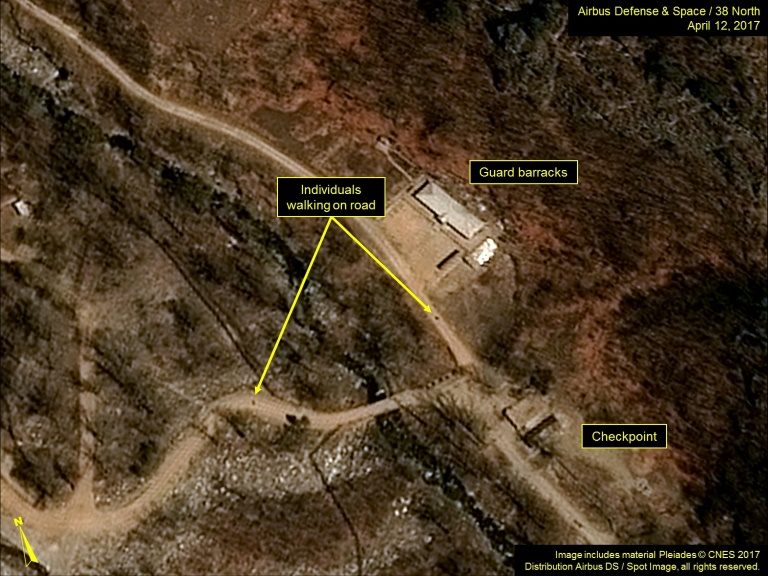N. Korea preps nuclear site demolition despite US summit doubts


By ![]()
Invited foreign journalists gathered in North Korea Wednesday to witness the slated destruction of the reclusive regime’s nuclear test site, a high profile gesture on the road to a summit with the US that Donald Trump now says might not happen.
In a surprise announcement Pyongyang said earlier this month that it planned to “completely” destroy the Punggye-ri facility in the country’s northeast, a move welcomed by Washington and Seoul.
Punggye-ri has been the site of all six of the North’s nuclear tests, the latest and by far the most powerful in September last year, which Pyongyang said was an H-bomb.
The demolition is due to take place sometime between Wednesday and Friday, depending on the weather.
The North has portrayed the destruction on the test site as a goodwill gesture ahead of planned June 12 summit between Kim and Trump in Singapore.
 AFP / Gal ROMANorth Korea missile and nuclear sites
AFP / Gal ROMANorth Korea missile and nuclear sitesBut doubts have since been cast by both sides on whether that potentially historic meeting will take place.
Last week Pyongyang threatened to pull out if Washington pressed for its unilateral nuclear disarmament. Trump also said the meeting could be delayed as he met with South Korean leader Moon Jae-in in Washington on Tuesday.
“There are certain conditions we want to happen. I think we’ll get those conditions. And if we don’t, we won’t have the meeting,” he told reporters, without elaborating on what those conditions might be.
– ‘Thin ice’ –
Politically, Trump has invested heavily in the success of his meeting with Kim, and so privately most US officials, as well as outside observers, believe it will go ahead.
But as the date draws near, Trump’s divergence from his top aides, the differences between the two sides and these high stakes are coming into sharp relief.
 AFP / STRA commemorative coin struck by the White House Communications Agency ahead of the June 12 summit
AFP / STRA commemorative coin struck by the White House Communications Agency ahead of the June 12 summitWashington has made it clear it wants to see the “complete, verifiable and irreversible denuclearisation” of the North.
Pyongyang has vowed it will never give up its nuclear deterrence until it feels safe from what is sees as US aggression.
“Everything is on thin ice,” Koo Kab-woo, a professor at the University of North Korean Studies in Seoul, told AFP.
“Trump wants a swift denuclearisation, something that will be done within his first term in office. In that case, he has to provide North Korea with a corresponding, swift security guarantee.”
Observers will be watching the nuclear test site destruction ceremony closely for any clues to the North’s mood.
Experts are divided over whether the demolition will render the site useless. Sceptics say the site has already outlived its usefulness with six successful nuclear tests in the bag and can quickly be rebuilt if needed.
Previous similar gestures by the North have been rapidly reversed when the international mood soured.
But others say the fact that North Korea agreed to destroy the site without preconditions or asking for something in return from Washington is significant.
– ‘Game of chicken’ –
Go Myong-hyun, an analyst at the Asan Institute for Policy Studies, said both sides were playing “a game of chicken” in the run up to the summit “to gain an upper hand in negotiations”.
He said the destruction of the Punggye-ri test site would win Pyongyang international sympathy even if the summit collapses.
 AFP / Ed JONESNorth Korea has said it will not give up its nuclear weapons until it feels safe from what it says is US aggression
AFP / Ed JONESNorth Korea has said it will not give up its nuclear weapons until it feels safe from what it says is US aggression “North Korea can say to the international community that it did its best to achieve denuclearisation through negotiations but was pressured by the United States and couldn’t do it,” he said.
A handful of foreign journalists, including from South Korea, were invited to attend the demolition ceremony.
Reporters from China, the US and Russia departed on a charter flight from Beijing on Tuesday for the North Korean city of Wonsan.
From there they are expected to travel for some 20 hours up the east coast by train and bus to the remote test site — a vivid illustration of the impoverished country’s notoriously decrepit transport infrastructure.
South Korean journalists were initially left off the flight because they were not granted permission by Pyongyang.
But on Wednesday Seoul’s Unification Ministry said they had been allowed to attend at the last minute.
The ministry said it planned to arrange a rare direct flight on Wednesday between the two countries, who remain technically at war, to ferry the journalists to Wonsan.
Agence France-Presse is one of a number of major media organisations not invited to cover the demolition.
On Seoul’s streets Wednesday, South Koreans were divided on whether they thought Pyongyang was sincere.
“I don’t really have any faith,” said Korean-American businessman Peter Chung. “But you know, like I said I hope for the best.”
But Kim Ye-seul, a nutritionist in her early thirties, said she didn’t feel North Korea should be made to abandon its nuclear weapons.
“Do we really need denuclearisation as a premise for unification?” she said.